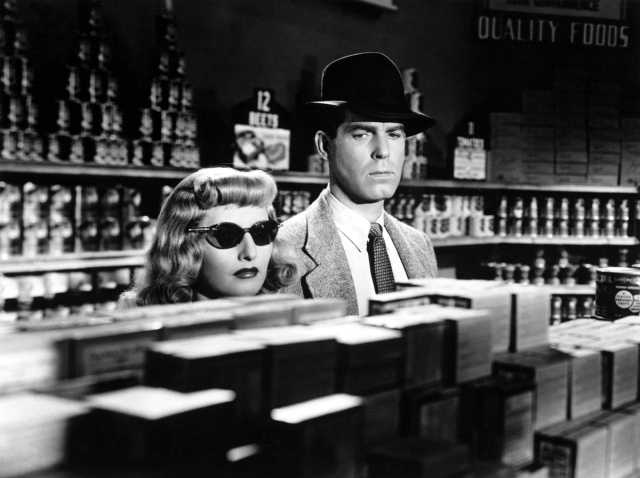
At it surface (and, indeed, from the opening scenes of the film) the viewer can very easily discern the usual hallmarks of film noir: the traditional femme fatale, the ‘weaker’ man, even those delightful venetian blinds —all entwined together in the plot of dispassionate and near-perfect murder. (For if it were to be truly perfect wherever would this film lead?) As we venture further into this spiralling adventure though, we can be quite certain that Wilder’s Double Indemnity is not typical. Definitive definitely, but never, by any stretch of the imagination, something ordinary.
The meaning of the movie’s title, Double Indemnity, is explained early on by Walter Neff, a whip-smart insurance salesman and our fascinating film protagonist.
There’s a clause in every accident policy; a little thing called double indemnity. The insurance company put in a sort of a come-on for the customers. That means they pay double on certain accidents. The kind that almost never happen. Like for instance, if a guy is killed on a train…
It is with the idea of double indemnity that Neff seals his deal (and his fate) with Phyllis Dietrichson, the bored and ruthless housewife. Sensing an urge to rid herself of her husband, and keen to win the affections of this beautiful woman, Walter Neff greedily snatches up his opportunity. Knowing the ropes, every ruse and every trick the layman can throw at you, Walter delivers to the table an elaborate plan of murder. It is carried out practically without a hitch.
Phyllis drives her husband (who, in a surprising turn of events, has broken his leg) to the train station. At the same time, Neff hides in the backseat of the car. On Phyllis’ signal, he silently kills the man. By the time the two roll in to the station, Neff has been suitably transformed; his foot is bandaged, he wears an obscuring fedora, and walks with the crutches of the dead man. Upon boarding the train, Neff makes his apparent identity clear, and, after doing so, hurries down to the observation car. He then jumps off the designated spot where Phyllis (and that rather ominous dead body) is waiting for him. The two lay Dietrichson on the tracks, carefully position his crutches in a seemingly haphazard manner, and subsequently drive away steadily.
However, to place too much importance on this narrative arc would not actually be completely wise (although obviously justified, it’s a pretty good one). Because, it is not the way the murder is executed that is of most interest; rather, it is the manner in which we arrive at this crucial event, and the characters (and their actions) concerned in its intriguing aftermath.

More important to the movie is Billy Wilder’s style, the visual nuances that make the film a classic. One great, yet almost insignificant example, is the bowling scene. To take his mind off Mrs Dietrichson’s unnerving proposal of murder, Walter goes bowling. The camera focusses on the end of his lane, and fleetingly captures a jarring split, gone in approximately one second. It is a perfect metaphor for the divided and disconcerted Walter Neff.
Upon reaching the much-anticipated end of Double Indemnity, you can find yourself wondering “What exactly was going through their heads?” The two do not murder because they want the money, for the whole idea of $100 000 seems to have thoroughly vanished by the film’s finish. It doesn’t seem to be a crime of passion either —Phyllis and Walter’s already tepid romance disintegrates into borderline hate.
As for the shattering climax, Phyllis’ realisation and apparent plea of love, it too is difficult to validate. Surely we should be a bit more savvy like Walter, and see through this ‘rotten to the very core’ woman quite easily. And yet, her eyes shine with this perfect authenticity; there is a tragedy in that single moment, a what if that lingers long after the final frame.
I fell in love with Barbara Stanwyck in this film. Have you seen her in Baby Face? It’s a little different, but she is equally as wonderful.
No, I haven’t seen it yet, but I really hope to soon! Pre-code Warner Bros. and Barbara Stanwyck seems like a completely winning combination :)
Just received the 70th Anniversary Blu Ray edition this week. Looking forward to watching Monday morning. And here is another vote for Baby Face….